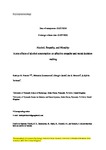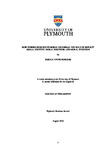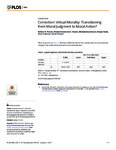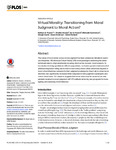Alcohol, empathy, and morality: acute effects of alcohol consumption on affective empathy and moral decision-making
| dc.contributor.author | Francis, KB | |
| dc.contributor.author | Gummerum, M | |
| dc.contributor.author | Ganis, Giorgio | |
| dc.contributor.author | Howard, Ian | |
| dc.contributor.author | Terbeck, Sylvia | |
| dc.date.accessioned | 2019-08-08T07:14:08Z | |
| dc.date.issued | 2019-07-09 | |
| dc.identifier.issn | 0033-3158 | |
| dc.identifier.issn | 1432-2072 | |
| dc.identifier.uri | http://hdl.handle.net/10026.1/14771 | |
| dc.description.abstract |
RATIONALE: Hypothetical moral dilemmas, pitting characteristically utilitarian and non-utilitarian outcomes against each other, have played a central role in investigations of moral decision-making. Preferences for utilitarian over non-utilitarian responses have been explained by two contrasting hypotheses; one implicating increased deliberative reasoning, and the other implicating diminished harm aversion. In recent field experiments, these hypotheses have been investigated using alcohol intoxication to impair both social and cognitive functioning. These studies have found increased utilitarian responding, arguably as a result of alcohol impairing affective empathy. OBJECTIVES: The present research expands existing investigations by examining the acute effects of alcohol on affective empathy and subsequent moral judgments in traditional vignettes and moral actions in virtual reality, as well as physiological responses in moral dilemmas. METHODS: Participants (N = 48) were administered either a placebo or alcohol in one of two dosages; low or moderate. Both pre- and post intervention, participants completed a moral action and moral judgment task alongside behavioural measures of affective empathy. RESULTS: Higher dosages of alcohol consumption resulted in inappropriate empathic responses to facial displays of emotion, mirroring responses of individuals high in trait psychopathy, but empathy for pain was unaffected. Whilst affective empathy was influenced by alcohol consumption in a facial responding task, both moral judgments and moral actions were unaffected. CONCLUSIONS: These results suggest that facets, beyond or in addition to deficits in affective empathy, might influence the relationship between alcohol consumption and utilitarian endorsements. | |
| dc.format.extent | 3477-3496 | |
| dc.format.medium | Print-Electronic | |
| dc.language | en | |
| dc.language.iso | en | |
| dc.publisher | Springer Verlag | |
| dc.subject | Moral decision-making | |
| dc.subject | Moral judgment | |
| dc.subject | Moral action | |
| dc.subject | Alcohol | |
| dc.subject | Empathy | |
| dc.subject | Virtual reality | |
| dc.title | Alcohol, empathy, and morality: acute effects of alcohol consumption on affective empathy and moral decision-making | |
| dc.type | journal-article | |
| dc.type | Journal Article | |
| plymouth.author-url | https://www.webofscience.com/api/gateway?GWVersion=2&SrcApp=PARTNER_APP&SrcAuth=LinksAMR&KeyUT=WOS:000509097900010&DestLinkType=FullRecord&DestApp=ALL_WOS&UsrCustomerID=11bb513d99f797142bcfeffcc58ea008 | |
| plymouth.issue | 12 | |
| plymouth.volume | 236 | |
| plymouth.publication-status | Published | |
| plymouth.journal | Psychopharmacology | |
| dc.identifier.doi | 10.1007/s00213-019-05314-z | |
| plymouth.organisational-group | /Plymouth | |
| plymouth.organisational-group | /Plymouth/Faculty of Health | |
| plymouth.organisational-group | /Plymouth/Faculty of Health/School of Psychology | |
| plymouth.organisational-group | /Plymouth/Faculty of Science and Engineering | |
| plymouth.organisational-group | /Plymouth/Faculty of Science and Engineering/School of Engineering, Computing and Mathematics | |
| plymouth.organisational-group | /Plymouth/REF 2021 Researchers by UoA | |
| plymouth.organisational-group | /Plymouth/REF 2021 Researchers by UoA/UoA04 Psychology, Psychiatry and Neuroscience | |
| plymouth.organisational-group | /Plymouth/REF 2021 Researchers by UoA/UoA04 Psychology, Psychiatry and Neuroscience/UoA04 REF peer reviewers | |
| plymouth.organisational-group | /Plymouth/REF 2021 Researchers by UoA/UoA11 Computer Science and Informatics | |
| plymouth.organisational-group | /Plymouth/Research Groups | |
| plymouth.organisational-group | /Plymouth/Research Groups/Centre for Brain, Cognition and Behaviour (CBCB) | |
| plymouth.organisational-group | /Plymouth/Research Groups/Centre for Brain, Cognition and Behaviour (CBCB)/Brain | |
| plymouth.organisational-group | /Plymouth/Research Groups/Centre for Brain, Cognition and Behaviour (CBCB)/Cognition | |
| plymouth.organisational-group | /Plymouth/Users by role | |
| plymouth.organisational-group | /Plymouth/Users by role/Academics | |
| dc.publisher.place | Germany | |
| dcterms.dateAccepted | 2019-06-30 | |
| dc.rights.embargodate | 2019-8-9 | |
| dc.identifier.eissn | 1432-2072 | |
| dc.rights.embargoperiod | Not known | |
| rioxxterms.versionofrecord | 10.1007/s00213-019-05314-z | |
| rioxxterms.licenseref.uri | http://www.rioxx.net/licenses/all-rights-reserved | |
| rioxxterms.licenseref.startdate | 2019-07-09 | |
| rioxxterms.type | Journal Article/Review |





